C Program Currently I have everything I need up until the la
C Program:
Currently I have everything I need up until the last print out line: \"The CRC observed at the end of the input: \". This program only takes in two argv values the first agrv[1] is either c or v followed by agv[2] which is D2B9CB. I need to somehow write a function that returns the last 3 of the input string both in binary and hexadecimal. HERE IS MY CODE THUS FAR:
//Libraries
#include <stdio.h>
#include <stdlib.h>
#include <string.h>
//Functional Prototypes
void modeType(char *argv);
void hexConvert(char hex[60]);
void calcPrint(char *argv);
//Polynomial: x^12 + x^11 + x^7 + x^5 + x^4 + x^1 + 1
const char poly[17] = \"1100 0101 1001 1\";
int main (int argc, char *argv[]) {
//Header print out
printf(\"CRC Tester by [Your-name]\ \ \");
fflush(stdout);
//Error and exit out if argv are not entered correctly
if(argc != 3) {
printf(\"ERROR - Entered invlaid number of arguments\ \");
fflush(stdout);
exit(0);
}
//Mode type print out
printf(\"Mode of operation: \");
fflush(stdout);
modeType(argv[1]);
//Hex value print out
printf(\"The input string (hex): %s\ \", argv[2]);
fflush(stdout);
//Binary print out of hex values
if (strlen(argv[2]) >= 3 && strlen(argv[2]) < 41) {
printf(\"The input string (bin): \");
fflush(stdout);
hexConvert(argv[2]);
printf(\"\ \");
fflush(stdout);
}
else {
printf(\"ERROR - Invalid hexadecimal length\ \");
exit(0);
}
//Print out of polynomial value in binary
printf(\"\ The polynomial that was used (binary bit string): %s\ \", poly);
fflush(stdout);
//Fifth output if calculation is selected
calcPrint(argv[1]);
return 0;
}
//Function slects mode type for first argument
void modeType(char *argv) {
if(*argv == \'v\') {
printf(\"verification\ \");
fflush(stdout);
}
else if(*argv == \'c\') {
printf(\"calculation\ \");
fflush(stdout);
}
else {
printf(\"ERROR - Invalid argument\ \");
fflush(stdout);
exit(0);
}
}
//Function converts hex to binary values
void hexConvert(char hex[60]) {
int i = 0;
while (i < strlen(hex)) {
if (hex[i] == \'0\')
printf(\"0000 \");
else if (hex[i] == \'1\')
printf(\"0001 \");
else if (hex[i] == \'2\')
printf(\"0010 \");
else if (hex[i] == \'3\')
printf(\"0011 \");
else if (hex[i] == \'4\')
printf(\"0100 \");
else if (hex[i] == \'5\')
printf(\"0101 \");
else if (hex[i] == \'6\')
printf(\"0110 \");
else if (hex[i] == \'7\')
printf(\"0111 \");
else if (hex[i] == \'8\')
printf(\"1000 \");
else if (hex[i] == \'9\')
printf(\"1001 \");
else if (hex[i] == \'A\')
printf(\"1010 \");
else if (hex[i] == \'B\')
printf(\"1011 \");
else if (hex[i] == \'C\')
printf(\"1100 \");
else if (hex[i] == \'D\')
printf(\"1101 \");
else if (hex[i] == \'E\')
printf(\"1110 \");
else if (hex[i] == \'F\')
printf(\"1111 \");
i++;
}
}
//Function prints out append output in \"calculation\" mode
void calcPrint(char *argv) {
if (*argv == \'c\') {
printf(\"Number of zeroes that will be appended to the binary input: 12\ \");
fflush(stdout);
}
}
Solution
//Libraries
#include <stdio.h>
#include <stdlib.h>
#include <string.h>
//Functional Prototypes
void modeType(char *argv);
void hexConvert(char hex[60]);
void hexConvert_from_char(char hex); // added one more function to convert a
// hex char to binary
void calcPrint(char *argv);
//Polynomial: x^12 + x^11 + x^7 + x^5 + x^4 + x^1 + 1
const char poly[17] = \"1100 0101 1001 1\";
void process_last_3_digits(char * str){
// function to print last line
int len = strlen(str);
printf(\"The CRC observed at the end of the input :\");
// convert last 3 chars
hexConvert_from_char(str[len - 3]);
hexConvert_from_char(str[len - 2]);
hexConvert_from_char(str[len - 1]);
printf(\" (bin) = \");
printf(\"%c%c%c (hex) \ \", str[len-3], str[len - 2], str[len - 1] );
}
int main (int argc, char *argv[]) {
//Header print out
printf(\"CRC Tester by [Your-name]\ \ \");
fflush(stdout);
//Error and exit out if argv are not entered correctly
if(argc != 3) {
printf(\"ERROR - Entered invlaid number of arguments\ \");
fflush(stdout);
exit(0);
}
//Mode type print out
printf(\"Mode of operation: \");
fflush(stdout);
modeType(argv[1]);
//Hex value print out
printf(\"The input string (hex): %s\ \", argv[2]);
fflush(stdout);
//Binary print out of hex values
if (strlen(argv[2]) >= 3 && strlen(argv[2]) < 41) {
printf(\"The input string (bin): \");
fflush(stdout);
hexConvert(argv[2]);
printf(\"\ \");
fflush(stdout);
}
else {
printf(\"ERROR - Invalid hexadecimal length\ \");
exit(0);
}
//Print out of polynomial value in binary
printf(\"\ The polynomial that was used (binary bit string): %s\ \", poly);
fflush(stdout);
//Fifth output if calculation is selected
//calcPrint(argv[1]);
process_last_3_digits(argv[2]);
return 0;
}
//Function slects mode type for first argument
void modeType(char *argv) {
if(*argv == \'v\') {
printf(\"verification\ \");
fflush(stdout);
}
else if(*argv == \'c\') {
printf(\"calculation\ \");
fflush(stdout);
}
else {
printf(\"ERROR - Invalid argument\ \");
fflush(stdout);
exit(0);
}
}
//Function converts hex to binary values
void hexConvert(char hex[60]) {
int i = 0;
while (i < strlen(hex)) {
if (hex[i] == \'0\')
printf(\"0000 \");
else if (hex[i] == \'1\')
printf(\"0001 \");
else if (hex[i] == \'2\')
printf(\"0010 \");
else if (hex[i] == \'3\')
printf(\"0011 \");
else if (hex[i] == \'4\')
printf(\"0100 \");
else if (hex[i] == \'5\')
printf(\"0101 \");
else if (hex[i] == \'6\')
printf(\"0110 \");
else if (hex[i] == \'7\')
printf(\"0111 \");
else if (hex[i] == \'8\')
printf(\"1000 \");
else if (hex[i] == \'9\')
printf(\"1001 \");
else if (hex[i] == \'A\')
printf(\"1010 \");
else if (hex[i] == \'B\')
printf(\"1011 \");
else if (hex[i] == \'C\')
printf(\"1100 \");
else if (hex[i] == \'D\')
printf(\"1101 \");
else if (hex[i] == \'E\')
printf(\"1110 \");
else if (hex[i] == \'F\')
printf(\"1111 \");
i++;
}
}
//Function converts hex char to binary values, same as above but only for a char
void hexConvert_from_char(char hex) {
if (hex == \'0\')
printf(\"0000 \");
else if (hex == \'1\')
printf(\"0001 \");
else if (hex == \'2\')
printf(\"0010 \");
else if (hex == \'3\')
printf(\"0011 \");
else if (hex == \'4\')
printf(\"0100 \");
else if (hex == \'5\')
printf(\"0101 \");
else if (hex == \'6\')
printf(\"0110 \");
else if (hex == \'7\')
printf(\"0111 \");
else if (hex == \'8\')
printf(\"1000 \");
else if (hex == \'9\')
printf(\"1001 \");
else if (hex == \'A\')
printf(\"1010 \");
else if (hex == \'B\')
printf(\"1011 \");
else if (hex == \'C\')
printf(\"1100 \");
else if (hex == \'D\')
printf(\"1101 \");
else if (hex == \'E\')
printf(\"1110 \");
else if (hex == \'F\')
printf(\"1111 \");
}
//Function prints out append output in \"calculation\" mode
void calcPrint(char *argv) {
if (*argv == \'c\') {
printf(\"Number of zeroes that will be appended to the binary input: 12\ \");
fflush(stdout);
}
}
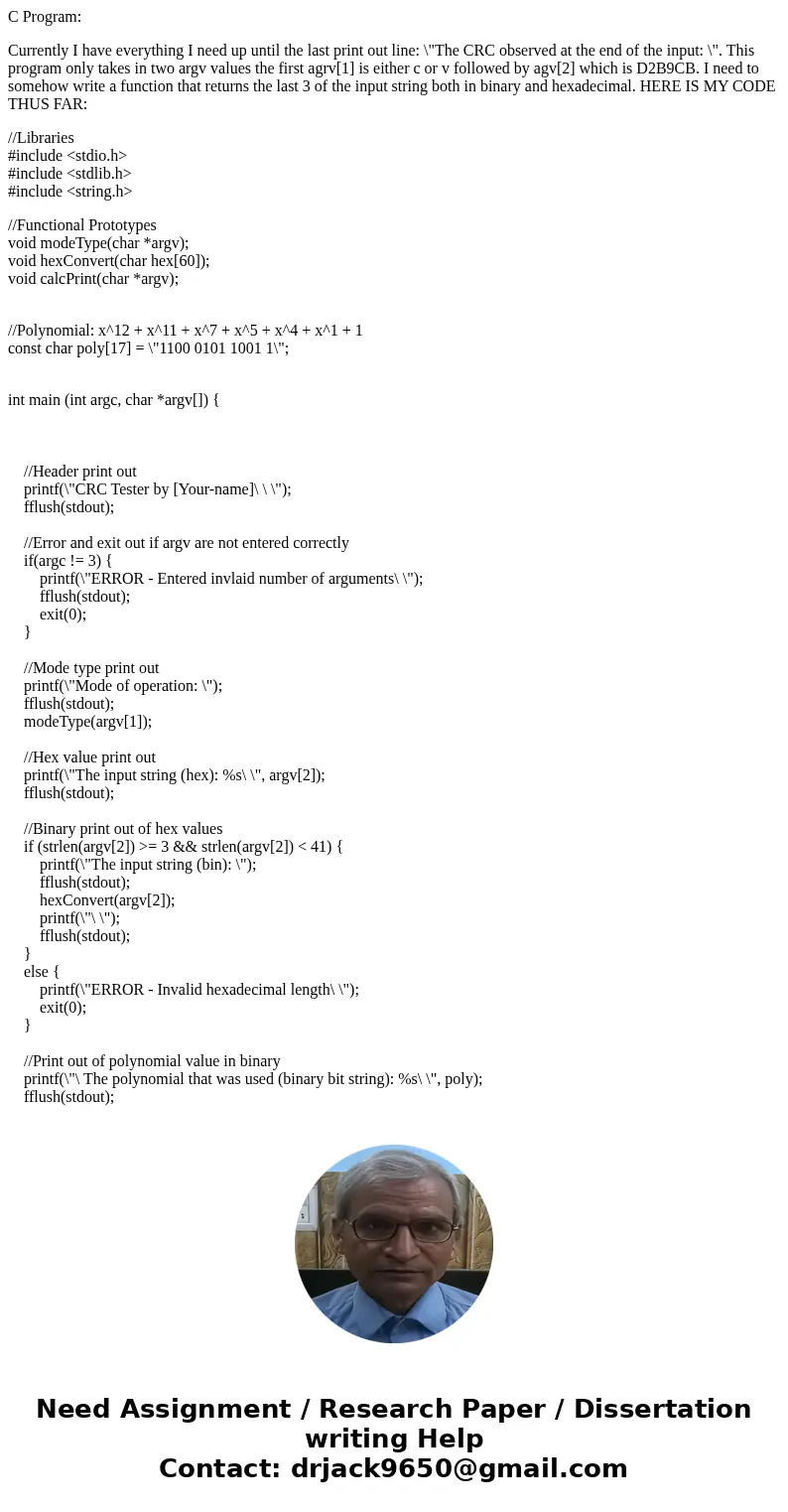
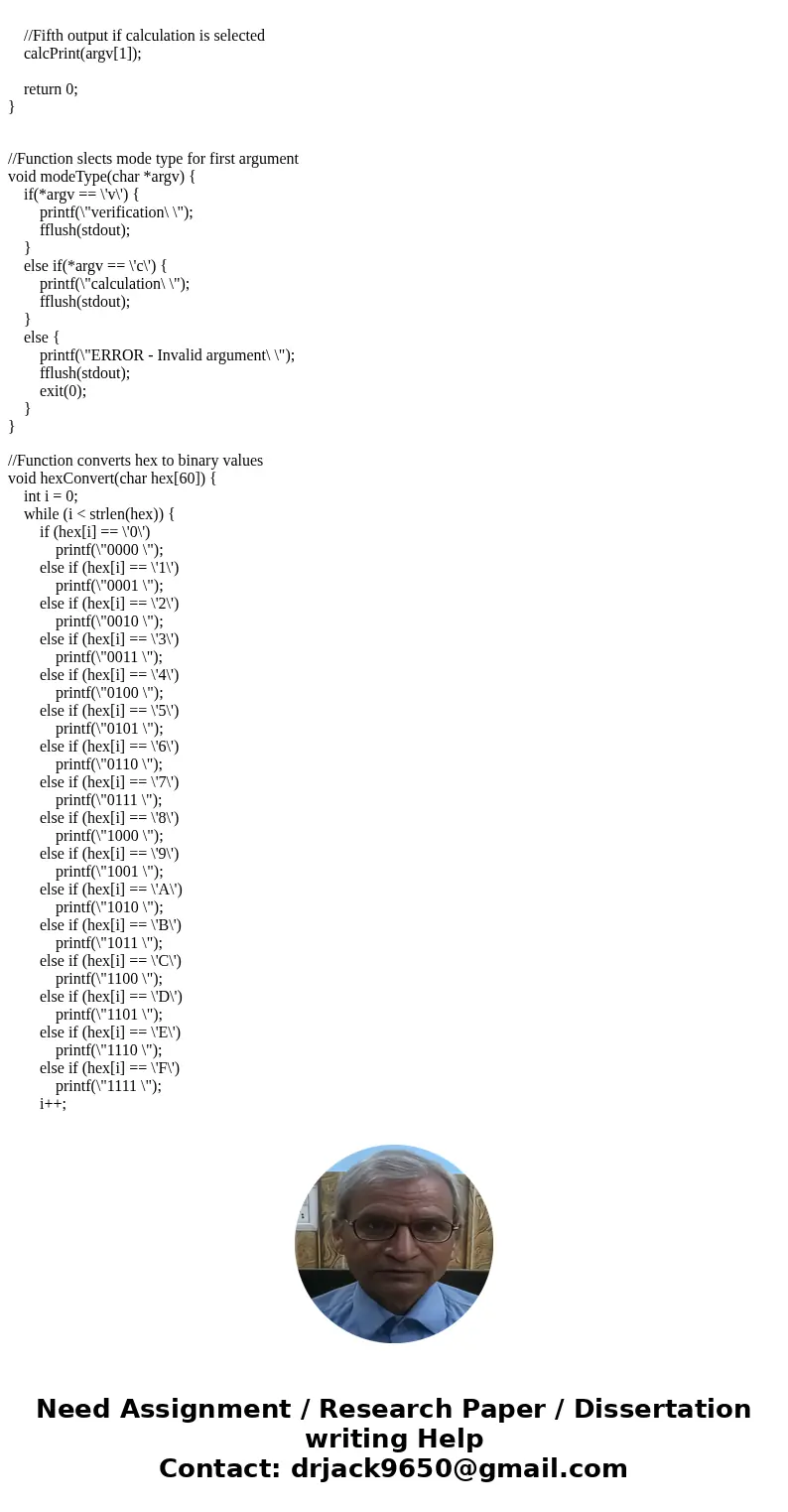
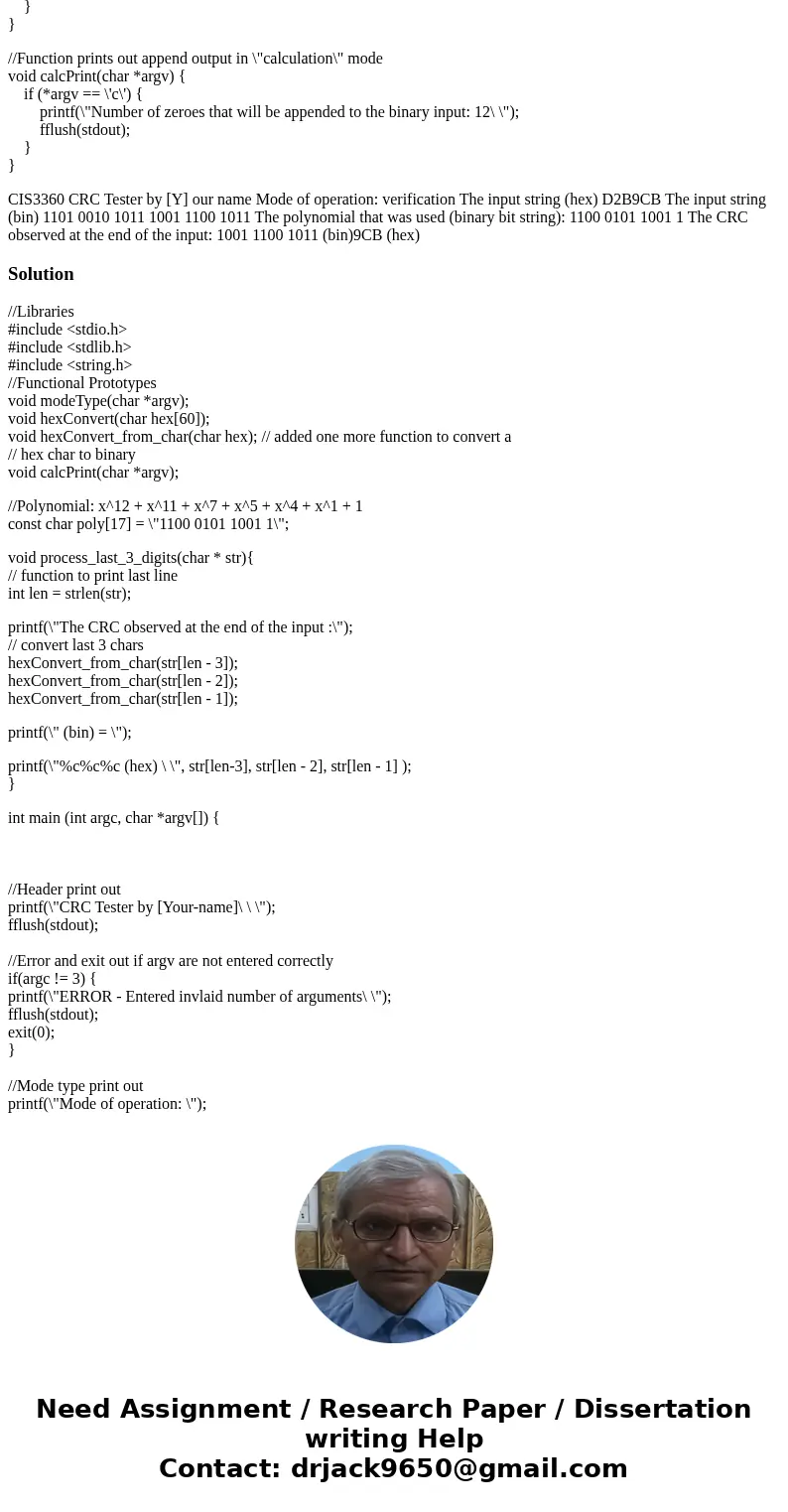
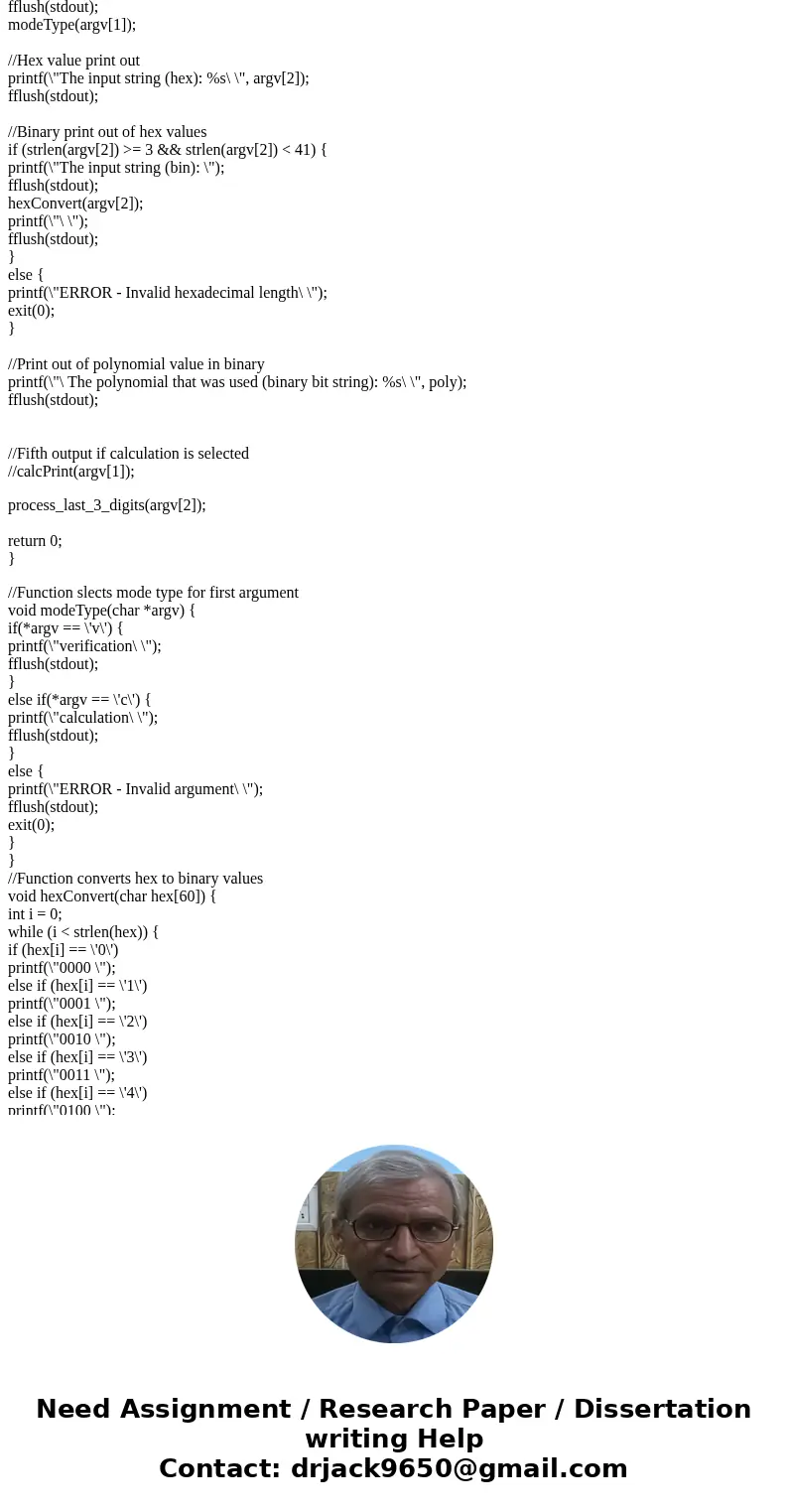
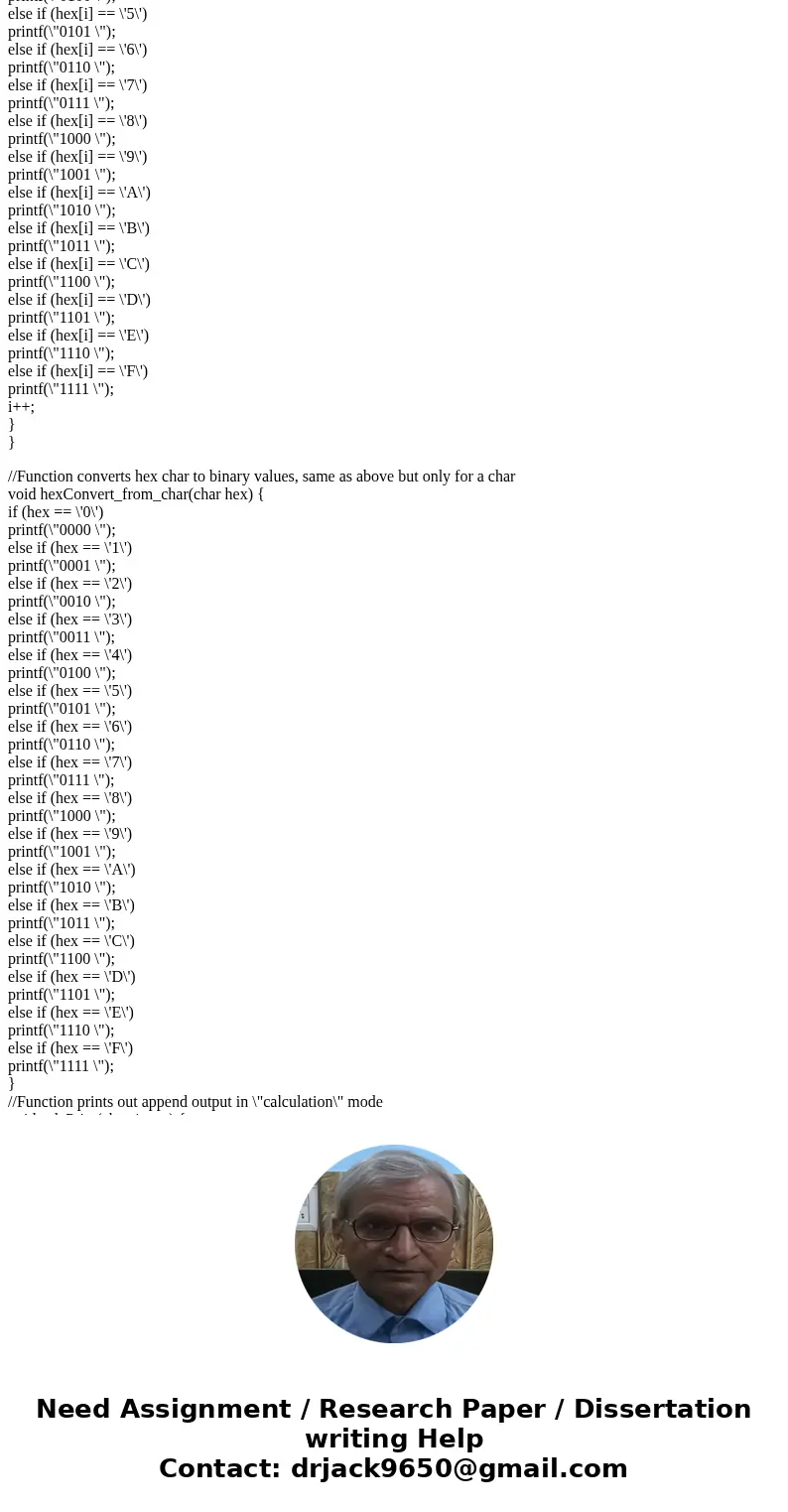
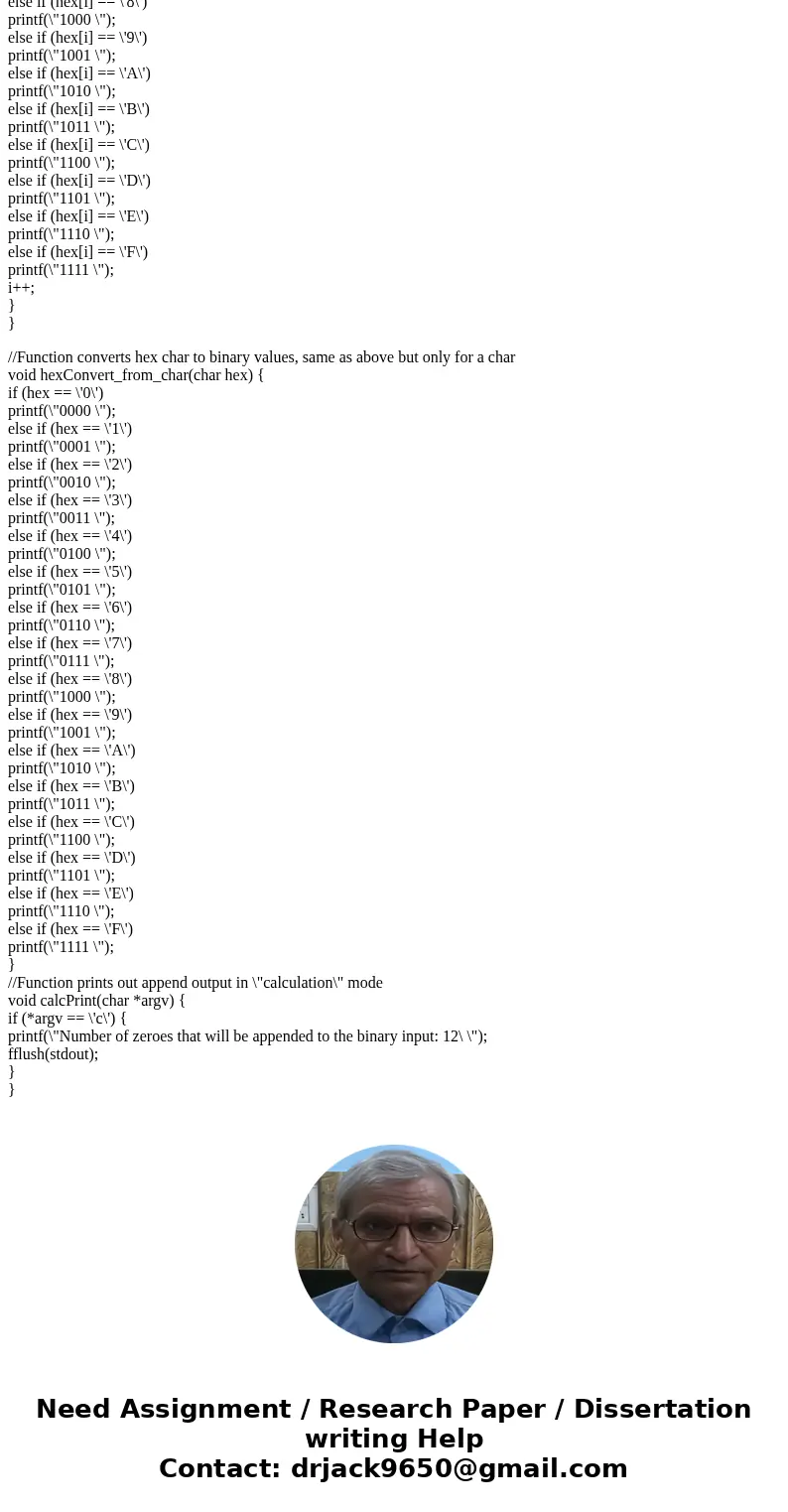
 Homework Sourse
Homework Sourse